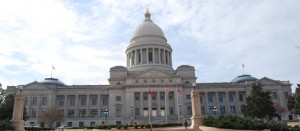 By Steve Brawner
By Steve Brawner
© 2016 by Steve Brawner Communications, Inc.
When the Legislature meets in regular session starting in mid-January, Gov. Asa Hutchinson wants to cut taxes, increase funding for the state’s foster care system, and change the way colleges and universities are funded.
What he does not want is a bathroom bill.
Hutchinson does not want Arkansas to have the same experience as North Carolina. There, the city of Charlotte passed a broad gay rights ordinance which included a provision allowing individuals to use bathrooms based on their gender identity. The state Legislature then passed a bill repealing it and prohibiting all other cities from enacting their own local gay rights ordinances. Attracting the most attention was a provision whereby the state became the first to require individuals to use bathrooms corresponding to the gender listed on their birth certificate, a listing the legislation allowed those individuals to change.
That law made North Carolina ground zero for this latest culture war battle. Entertainers and, more importantly, big businesses expressed their disapproval. The NCAA pulled championship tournaments, the NBA cancelled an All-Star Game, and the company Paypal scuttled a plan to expand there. The Republican governor in November lost to his Democratic challenger – which didn’t happen in many places. A deal was made with the city of Charlotte where both the local ordinance and the state law would be repealed, but the Legislature voted Dec. 21 to keep the law in place.
While all of this was going on, the Obama administration released a heavy-handed “guidance” to every public school in the nation strongly encouraging them – underline “strongly” – to allow students to use restrooms and locker rooms conforming to their gender identity.
When that guidance was released, Hutchinson reacted by telling schools they should ignore it and make their own decisions. But he does not want Arkansas to become embroiled in a North Carolina-like controversy while he’s trying to court businesses from elsewhere.
He said in a press conference Dec. 20 that he has had “a lot of discussion” with legislators in hopes of keeping the focus on other areas. His view is that the issue is now being considered by the court system, that the Trump administration should be less intrusive than President Obama’s, that Arkansas doesn’t seem to have a big problem with bathroom controversies at the moment, and that, when it comes to schools, local administrators and school boards can handle this kind of thing without any edicts from above.
If anyone were to sponsor a bathroom bill, it would seem to be Rep. Bob Ballinger, R-Hindsville. The legislator sponsored the controversial Religious Freedom Restoration Act in 2015. Supporters said it was meant to protect business owners from having to violate their consciences by requiring them, for example, to participate in a gay wedding. Opponents said it allowed more discrimination.
Ballinger said recently that he does not intend to file a general bathroom bill and does not know of anyone who does, but he can’t speak for 134 other legislators. Instead, he’s looking at more specific bills – for example, one that targets acts of indecent exposure in bathrooms, and one that increases the penalties for taking photographs of victims in stalls.
“There’s some things like that, that I expect that we’ll probably address simply because we have a change in culture, and with a change in culture you’ve got to have laws that are consistent with it in order to protect the public,” he said.
That’s a better way to handle it, at least for now, than some far-reaching bill. Address harms on which most of us should agree. Anyone want to defend indecent exposure and unwanted picture-taking in the bathroom? Meanwhile, avoid a humongous controversy until one might be necessary.
The whole bathroom debate took an ugly turn in 2016 and played a bigger role in the elections than it’s being given credit for. Maybe 2017 will offer more clarity through the new presidential administration or a court decision. Maybe society will come to a reasonable consensus that respects everyone’s vulnerabilities without the federal government telling every establishment in the land what their bathrooms have to look like – and without any level of government adding “patrol bathrooms” to the list of police officers’ duties. Maybe it will become more commonplace for establishments to have only single-toilet, gender-neutral restrooms with locking doors. We’ll have to stand in line longer sometimes, but we’ll have more privacy.
Whatever happens, may we all just go to the bathroom in peace. Happy 2017.
